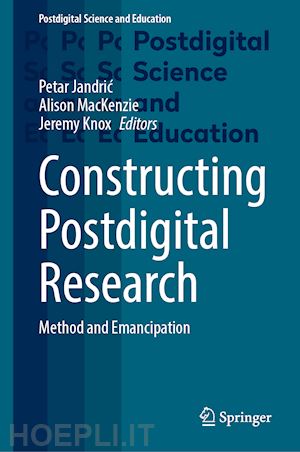

Questo prodotto usufruisce delle SPEDIZIONI GRATIS
selezionando l'opzione Corriere Veloce in fase di ordine.
Pagabile anche con Carta della cultura giovani e del merito, 18App Bonus Cultura e Carta del Docente
This book delves into the various methods of constructing postdigital research, with a particular focus on the postdigital dynamic of inclusion and exclusion, as well as the interplay between method and emancipation. By answering three fundamental questions - the relationship between postdigital theory and research practice, the relationship between method and emancipation, and how to construct emancipatory postdigital research - the book serves as a comprehensive resource for those interested in conducting postdigital research.
Constructing Postdigital Research: Method and Emancipation is complemented by Postdigital Research: Genealogies, Challenges, and Future Perspectives, also edited by Petar Jandric, Alison MacKenzie, and Jeremy Knox, which explores these questions in theory.
Part 1: Constructing Postdigital Research.- 1.Artificial intelligence in education research: a critical analysis and case study.- 2.Algorithmic systems claim education - and (re)production of societies.- 3.Constructing design knowledge for postdigital science and education.- 4.Collaborative Immersive Qualitative Analysis – A scenographic turn in postdigital research.- 5.Post-qualitative approaches in and for the postdigital age: towards speculative empirical methodologies.- 6.Discovering postdigital contexts using Actor Network Theory. A methodological toolkit and guide.- Part 2: Exclusions and Inclusions.- 7.International Human Rights in The Posthuman Era.- 8.Understanding children’s civil, political and social rights through a postdigital epistemology of silence.- 9.Digital Online Code of Practice and Human Rights Conventions to Protect Women Against Violence: Feminist Philosophy as Postdigital Method.- 10.Caring cuts into the postdigital – exploring postdigital methodologies withfeminist STS approaches.- 11.Va and post–simultaneities: indigenising posthumanism and the postdigital research relatings.- Part 3: Method and Emancipation.- 12.What’s not to learn? A critical evaluation of the potential impact of Postdigital arts-based research as Resistance.- 13.Postdigital soundscape research.- 14.Maps as method in critical applied linguistics.- 15.Epistemological implications of digital messaging platforms: a case study in Lebanon.- 16.Vestigial Research for Postdigital Pataphysics.
Petar Jandric is Professor at the Zagreb University of Applied Sciences, Croatia. Petar’s research interests are at the postdisciplinary intersections between technologies, pedagogies, and the society, and research methodologies of his choice are inter-, trans-, and antidisciplinarity. He is the Editor-in-Chief of Postdigital Science and Education journal, https://www.springer.com/journal/42438, Postdigital Science and Education book series, https://www.springer.com/series/16439, and Encyclopedia of Postdigital Science and Education, https://link.springer.com/referencework/10.1007/978-3-031-35469-4. His recent books include The Methodology and Philosophy of Collective Writing (2021), Bioinformational Philosophy and Postdigital Knowledge Ecologies (2022), Postdigital Ecopedagogies: Genealogies, Contradictions, and Possible Futures (2022), and Postdigital Research: Genealogies, Challenges, and Future Perspectives (2023). Personal website: http://petarjandric.com/.
Alison MacKenzie is a Reader at Queen’s University, Belfast. Alison’s research interests are in applied philosophy, particularly feminist and postdigital philosophy, epistemic injustice, and the related fields of epistemologies of ignorance and deceit. Alison has written on critical disability, the Capabilities Approach, and Bourdieusian analytical sociology. Alison is an Associate Editor of the International Journal of Educational Research and is on the editorial board of a number of journals, including Postdigital Science and Education. Her recent edited books are Epistemology of Deceit in a Postdigital Era (2021) and Postdigital Research: Genealogies, Challenges, and Future Perspectives (2023).
Jeremy Knox is Senior Lecturer and Co-director of the Centre for Research in Digital Education at the University of Edinburgh. His research interests include the relationships between education, data-driven technologies, and wider society, and he has led projects funded by the ESRC and the British Council in the UK. Jeremy’s published work includes Posthumanism and the MOOC (2016), Artificial Intelligence and Inclusive Education (2019), The Manifesto for Teaching Online (2020), Data Justice and the Right to the City (2022), AI and Education in China (2023), and Postdigital Research: Genealogies, Challenges, and Future Perspectives (2023).











Il sito utilizza cookie ed altri strumenti di tracciamento che raccolgono informazioni dal dispositivo dell’utente. Oltre ai cookie tecnici ed analitici aggregati, strettamente necessari per il funzionamento di questo sito web, previo consenso dell’utente possono essere installati cookie di profilazione e marketing e cookie dei social media. Cliccando su “Accetto tutti i cookie” saranno attivate tutte le categorie di cookie. Per accettare solo deterninate categorie di cookie, cliccare invece su “Impostazioni cookie”. Chiudendo il banner o continuando a navigare saranno installati solo cookie tecnici. Per maggiori dettagli, consultare la Cookie Policy.